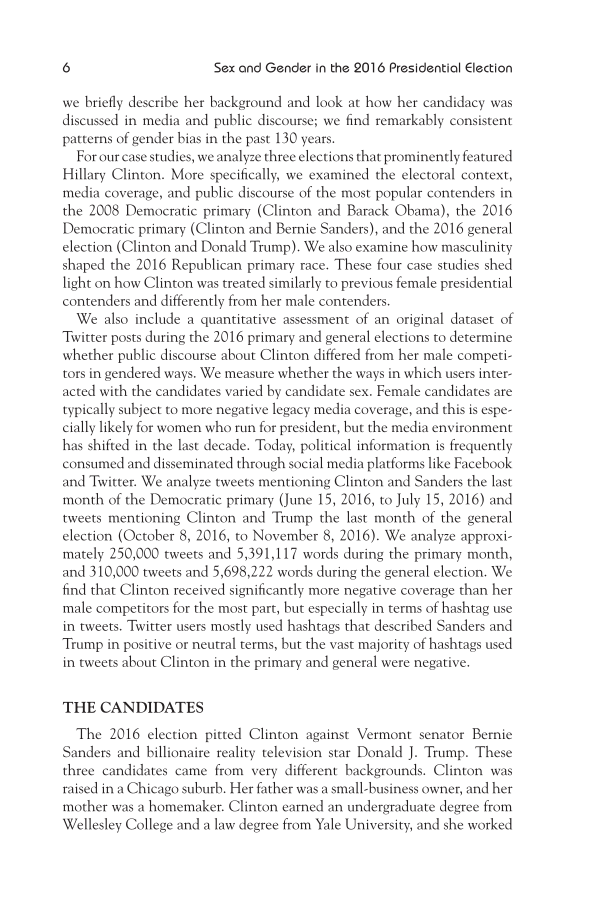6 Sex and Gender in the 2016 Presidential Election we briefly describe her background and look at how her candidacy was discussed in media and public discourse we find remarkably consistent patterns of gender bias in the past 130 years. For our case studies, we analyze three elections that prominently featured Hillary Clinton. More specifically, we examined the electoral context, media coverage, and public discourse of the most popular contenders in the 2008 Democratic primary (Clinton and Barack Obama), the 2016 Democratic primary (Clinton and Bernie Sanders), and the 2016 general election (Clinton and Donald Trump). We also examine how masculinity shaped the 2016 Republican primary race. These four case studies shed light on how Clinton was treated similarly to previous female presidential contenders and differently from her male contenders. We also include a quantitative assessment of an original dataset of Twitter posts during the 2016 primary and general elections to determine whether public discourse about Clinton differed from her male competi- tors in gendered ways. We measure whether the ways in which users inter- acted with the candidates varied by candidate sex. Female candidates are typically subject to more negative legacy media coverage, and this is espe- cially likely for women who run for president, but the media environment has shifted in the last decade. Today, political information is frequently consumed and disseminated through social media platforms like Facebook and Twitter. We analyze tweets mentioning Clinton and Sanders the last month of the Democratic primary (June 15, 2016, to July 15, 2016) and tweets mentioning Clinton and Trump the last month of the general election (October 8, 2016, to November 8, 2016). We analyze approxi- mately 250,000 tweets and 5,391,117 words during the primary month, and 310,000 tweets and 5,698,222 words during the general election. We find that Clinton received significantly more negative coverage than her male competitors for the most part, but especially in terms of hashtag use in tweets. Twitter users mostly used hashtags that described Sanders and Trump in positive or neutral terms, but the vast majority of hashtags used in tweets about Clinton in the primary and general were negative. THE CANDIDATES The 2016 election pitted Clinton against Vermont senator Bernie Sanders and billionaire reality television star Donald J. Trump. These three candidates came from very different backgrounds. Clinton was raised in a Chicago suburb. Her father was a small-business owner, and her mother was a homemaker. Clinton earned an undergraduate degree from Wellesley College and a law degree from Yale University, and she worked
Document Details My Account Print multiple pages
Print
You have printed 0 times in the last 24 hours.
Your print count will reset on at .
You may print 0 more time(s) before then.
You may print a maximum of 0 pages at a time.

































































































































































































































